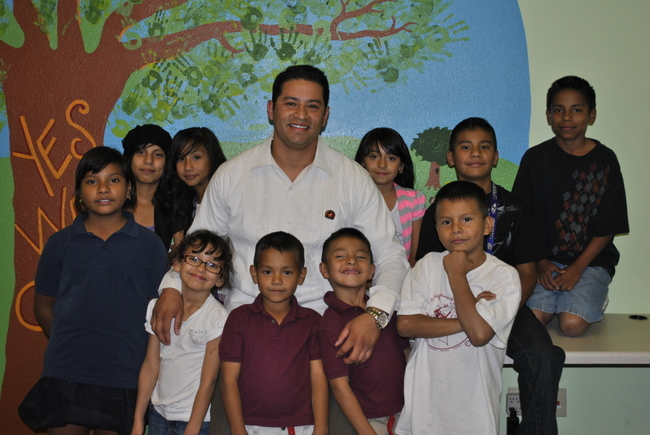
When Alfonso R. Trujillo visits the affordable housing communities that he oversees as Director of Property Management for the César Chávez Foundation, he remembers his own childhood. The son of immigrant farmworkers who came to the U.S. in 1972, Trujillo grew up in a Boyle Heights, Los Angeles Affordable Housing Complex.
He recalls playing baseball with his friends in the street and the lack of laundry facilities – his mother would hang hand-washed clothes in the common area between apartments. It was a safe place to call home, but there were none of the programs and services that are a priority for the Chávez Foundation, like the Si Se Puede Learning Centers (SSPLC) where kids can get help with homework and learn with their peers after school.
“When I visit our SSPLC programs at our César Chávez Foundation affordable housing communities, I’m elated by it,” said Trujillo, who became the first member of his family to earn a post-secondary degree from Cal Poly Pomona. “I’m glad we’re able to give back.”
He’s made supporting the families who live in Chávez Foundation’s communities a priority. Rather than outsourcing the running of laundry facilities to a third party vendor, it is now handled in house with profits going to the onsite SSPLC to supplement grant funding. The centers serve students from Kindergarten through sixth grade, and are a vital linchpin between school and home, especially for working parents.
Founded by legendary farm worker activist César E. Chávez , the Chávez Foundation’s Housing and Economic Development Fund has developed or refurbished over 4,300 units of housing in California, Arizona, New Mexico and Texas. Portfolio size has grown from $16 million in 1992 to $328 million today. The Chávez Foundation is a Yardi client, using Yardi Voyager to manage its affordable portfolio.
Sixty percent of the portfolio is made up of new properties developed by the Chávez Foundation, and 40 percent is renovated housing. Purchased properties are often bought to preserve affordable communities in danger of losing low-income status.
Throughout its rapid growth in the housing and community development sector, the Chávez Foundation has stayed true to the principles of its founder.
“The thing that really enticed me to this position was that the Chávez Foundation really makes an impact in the communities,” Trujillo told us. “We seek to empower communities and make change. When I met with the president of the company, Paul Chávez , he said – ‘My father was a firm believer that ordinary people can do extraordinary things, as long as we’re given an opportunity.’ That’s one of our core values here.”
That philosophy supports not only the community residents, the majority of whom are single mothers, but also the employees of the Foundation. Staff at the Chávez Foundation communities are encouraged to learn new skills through training programs and advance up the ranks of property management. One regional manager first started as a groundskeeper. Another site manager was homeless when she was hired and is now a top employee. Residents often get entry-level jobs at their properties and find a new career path.
The unlimited possibility of opportunity is a running theme with Trujillo, who needs only look to his own family to see the power of chasing a dream. When César Chávez and Dolores Huerta were marching through California in 1976 in support of workers’ rights, his parents, Alfonso and Elvira, wanted to join them, but could not leave the vineyards where they were harvesting grapes.
“It was a very tough time for my parents and my grandfather, extremely difficult for them to leave their work. In their hearts they wanted to march with César, but they couldn’t – if they left, they wouldn’t have been able to pay for their rent, food and living expenses. That’s impactful when there are eight members in the family.” Elvira Trujillo recalls praying for the marchers and their efforts to improve farm workers’ wages and lives. By the time Alfonso entered high school, his parents had saved up enough money to purchase their first home, and the family left affordable housing behind.
Keeping a close eye on finances is one of the major priorities for Trujillo in his current role, and has been a perspective shift from his previous work in the commercial sector.
“When you get involved in nonprofit and affordable housing, there really isn’t room for cash flow. You really have to be on your Ps and Qs. If you blink, you run the chance of not meeting your debt service. For me, they are much tighter properties to manage, because of the underwriting, and the affordability site component to it. You don’t get the rents you would see in a conventional property, and vendors don’t have any sympathy towards you being affordable, they charge the same rates. You really have to be very creative. ”
Having a team of committed staff members who understand the organization’s priorities while still closely monitoring expenses has been a key part of the Chávez Foundation’s success. Despite being spread out around the West and Southwest, the property managers videoconference regularly for meetings and updates. They’re all working together on what they call a BHAG – a Big Hairy Audacious Goal – in an effort to impact the lives of 5 million Latinos across the nation by 2022.
Affordable housing is just one component of that effort, which also includes a variety of other outreach programs like Radio Campesina, a two-state radio station network; The César Chávez Education Foundation, which helps struggling students; and the Villa la Paz Conference and Education Center, César Chávez’ home and workplace, which along with the museum was designated a National Historic Monument by President Obama earlier this week.
It’s an exciting time to be part of the foundation’s efforts, especially for someone as close to the experience as Trujillo.
“I enjoy being part of a powerful mission. To inspire and transform communities, I think, is a beautiful thing. Our founder had an incredible impact on our American history, and embedded this ‘Si, se puede’ attitude that trickles down all the way across the board to our staff. I enjoy being part of this great legacy and being part of a team that never gives up,” he said.


